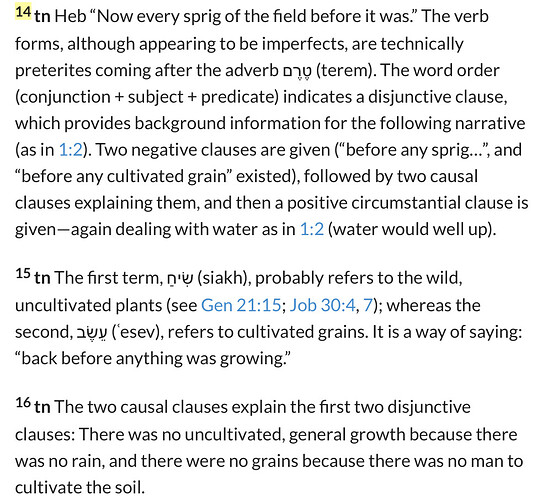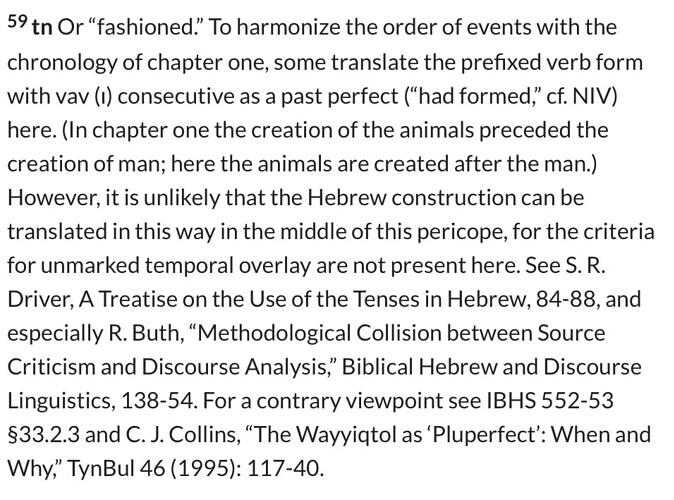two creation accounts?
I don’t have time to highlight summaries in the following…I have to go to work, however, anyone who is truly interested in why the above argument doesn’t pass the “stink test” should read the following in its entirety and determine for themselves where the flaws in the above argument are found.
There are plenty of other theological resources that carefully and accurately explain this issue.
AND NOTE what follows are not my words (contrary to the claims I fabricate this stuff of my own accord and am a YEC troll)
It is common for liberal critics of the Bible to assert that the book of Genesis contains two accounts of the creation of the Earth and mankind. Allegedly, these two accounts reflect different authors, different time periods, etc. It further is charged that the narratives contradict each other in several particulars.
Professor Kenneth Kitchen of the University of Liverpool has noted, “stylistic differences are meaningless” (1966, p. 118). Such differences may as much indicate a variance in the subject addressed as the suggestion of multiple authors. On the basis of archaeological evidence, Kitchen has shown that the “stylistic” theory simply is not credible. For example, a biographical inscription of Uni, an Egyptian official who lived about 2400 B.C., reflects at least four different styles, and yet no one denies the unity of its authorship (Kitchen, 1966, p. 125).
The plural authorship of the “creation accounts” is supposed to be indicated by the use of two names for deity in these sections. “God” (Elohim) is employed in Genesis 1, whereas “Jehovah” (Yahweh) is found in 2:4ff. In response it may be observed, first, that solid biblical research has clearly shown the use of different appellations for deity to possibly reflect a purposeful theological emphasis. For example, Elohim, which suggests “strength,” exalts God as the mighty Creator. Yahweh is the name that expresses the essential moral and spiritual nature of deity, particularly in terms of His relationship to the nation of Israel (see Stone, 1944, p. 17). Second, the multiple employment of titles was common in the literature of antiquity as a device of literary variety. Archaeological discoveries have amply illustrated this point.
While it is true that such expressions are found in chapter 2, what the critics have failed to notice is that anthropomorphic terminology also is employed in Genesis 1:1-2:4. In that section, God “called,” “saw,” “rested,” etc. (1:8,12; 2:1). There is no validity in this argument, and one is not surprised that serious scholars have labeled it “illusory” (Kitchen, 1966, p. 118).
E.A. Speiser has written: “The first account starts out with the creation of ‘heaven and earth’ (1:1). The present narrative begins with the making of ‘earth and heaven’ (2:4b).” Speiser goes on to emphasize that in the first record heavenly activity is in focus, while in the latter account man is the center of interest. He thus concluded: “This far-reaching divergence in basic philosophy would alone be sufficient to warn the reader that two separate sources appear to be involved, one heaven-centered and the other earth-centered” (Speiser, 1964, pp. 18-19). This argument for a dual authorship of Genesis 1 and 2 is truly unconvincing. Let us carefully note Genesis 2:4. “These are the generations of the heavens and the earth when they were created, in the day that Jehovah God made earth and heaven .” In this one verse there is contained the heaven/earth and earth/heaven motif. [Does this mean that two people must have written this one sentence?] Even the critics do not so contend!
Some suggest that in Genesis 1 the original creation of the botanical world is in view, while in Genesis 2 the emphasis is upon the fact that plant reproduction had not commenced, for as yet there was not sufficient moisture, nor a cultivator of the ground, which factors are remedied in verses 6-7 (Jacobus, 1864, 1:96).
Others agree that entirely different matters are in view in these respective accounts. In Genesis 1:11-12 vegetation in general is under consideration, but in Genesis 2:5ff. the writer is discussing the specific sort of vegetation that requires human cultivation. It has been observed “that the words rendered plant, field, and grew, never occur in the first chapter; they are terms expressive of the produce of labour and cultivation; so that the historian evidently means that no cultivated land and no vegetables fit for the use of man were yet in existence on the earth” (Browne, 1981, 1:39, emp. in orig.).
Another view is that Genesis 2:5 does not refer to the condition of the Earth at large; rather, the writer simply is discussing the preparation of the beautiful garden in which man was to live (Young, p. 61).
it is argued that Genesis 1 represents animals as existing before man (24-26), yet Genesis 2 has Adam created before the animals are formed (19). The text of Genesis 2:19 merely suggests that the animals were formed before being brought to man; it says nothing about the relative origins of man and beast in terms of chronology. The critic is reading something into the text that simply is not there. William Green pointed out that when noted scholar Franz Delitzsch (1813-1890), an advocate of the Documentary Hypothesis, first authored his famous commentary on Genesis, he employed this argument as a proof of a discrepancy between Genesis 1 and 2. However, in the last edition of his work, after his knowledge had matured, he repudiated this quibble and argued for the harmony of 2:19 with chapter 1 (Green, 1979, p. 26).

